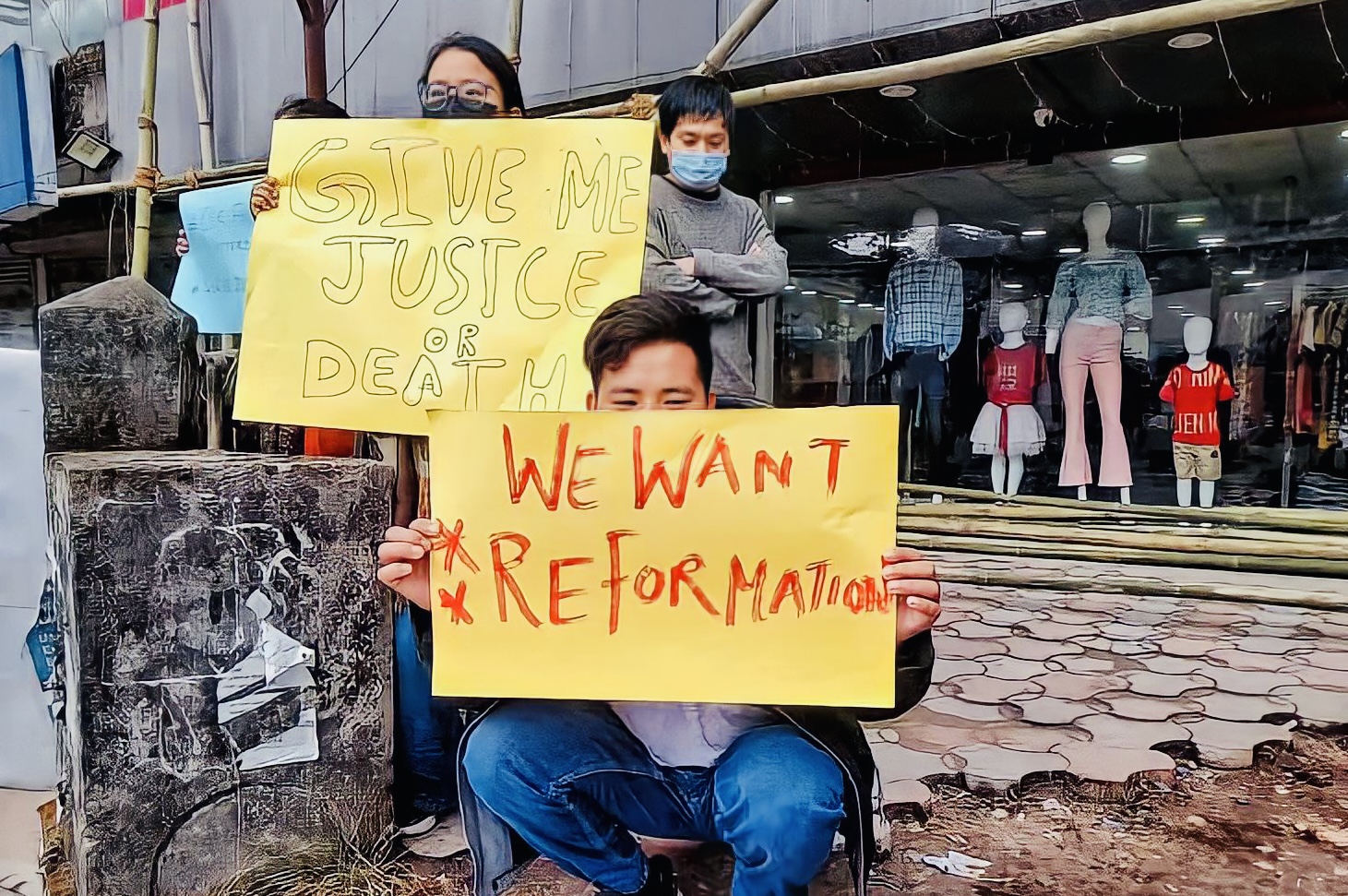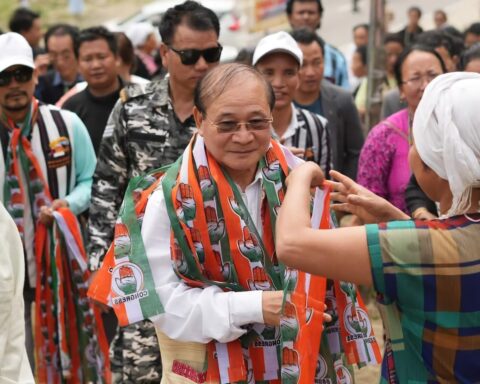On Saturday night, when representatives of the protesting aspirants of the Arunachal Pradesh Public Service Commission (APPSC) came out of the Civil Secretariat after a nine-hour meeting with chief minister Pema Khandu and senior government officials, the crowd outside that had swelled up to at least 3,000 people, cheered them on in anticipation of some good news.
Another set of people, 966 to be exact, were also awaiting the outcome of that meeting in various places across the state. They weren’t aspirants or necessarily protestors who had brought the capital to a standstill for two days. As the chairman of the Pan Arunachal Joint Steering Committee (PAJSC) Techi Puru read out point nine of the decisions that had been signed with the state government, their worst fears seemed to have come true.
For two days, the Itanagar Capital Region had seen violence and vandalism reminiscent of the 2019 anti-PRC protests, which incidentally also took place around Statehood Day. On the first day near the Raj Bhavan, stones were pelted from both sides of the fence and injuries were sustained by security personnel as well as protestors, including aspirants and other parties who claimed they were there to show solidarity with the genuine aspirants.
Both sides allege that the other began the stone-pelting and defended their actions as being reactionary. It was a scene more commonly seen in the Kashmir Valley until recently- surreal and scary.
At various places across the capital region, crowds had reached thousands. Not all were aspirants, of course. Many were genuine aspirants who had appeared in past examinations and/or plan to do so in the future. Several were there to show solidarity with them, including parents, relatives, and friends. A large number of them also seemed unaware of all 13, some, or any of the actual demands being made by the PAJSC, including ‘activists’ who had joined the protests out of their own will. Some from the last bunch even met with the chief minister on Saturday afternoon and emerged like conquering gladiators from the coliseum of the Civil Secretariat.
Copies of the minutes of the meeting have already been circulated and has been read and dissected by everyone & anyone interested in the issue.
Not everyone was happy about what had been decided.
One of the demands included “justice” for Mudang Yabyang, a Person with Disabilities (PwDs) who has appeared in competitive examinations to try & secure a job. While she argues that she has a right to a job under the reservation for PwDs, she also says that she’s being denied her right.
The PAJSC had demanded that she be given “justice” and “streamlining of PwDs section criteria”.
The official minutes from Saturday’s meeting said that the state government was “favourably disposed” to her issue and that it has already asked the APPSC to re-examine & reconsider the matter, and that it will do so again. When this was read out on Saturday night, a news channel camera pointed at her showed she was not entirely happy with the resolution.
She’s not alone in feeling that way.
Ever since the issue came to light, questions were raised about the integrity of past examinations conducted by the APPSC. After all, it wasn’t the first time that the Commission had come under scrutiny for examination malpractices. Police complaints were filed to investigate examinations conducted since 2014 and the state police’s SIT got on the case. Even though a steady stream of arrests were being made, repeated calls were also being made to hand over the case to the CBI.
The state government obliged and brought in the CBI to investigate the most recent case of the examination paper leak. But as the opaque nature of the CBI investigation began to become transparent, the aspirants grew frustrated and have doubts if it was the right step.
Saturday’s meeting and the preceding protests on the streets were the culmination of growing frustration. Aspirants and their supporters feel that the investigation is taking too long, that not enough arrests are being made, and that the higher-ups are being spared.
The PAJSC and its alleged supporters repeatedly claim to have audio proof of the involvement of the top echelons of the administration. However, whatever “proof” has surfaced has not shown to prove without doubt such claims.
But the cloud of doubt has hovered, and almost no serving government official who had appeared in examinations conducted by the APPSC since 2014 has been immune to doubts over the credibility of their recruitment results.
Family charts of administrative officers, engineers, and teachers have been circulating on social media ever since the issue came to light.
For the record, however, the PAJSC has never claimed to have made those charts.
In tribal societies like those in Arunachal with its relatively small population, relationships with people in positions of power are bound to exist and, thus, these charts could not have been difficult to make.
It isn’t just the investigation that the aspirants have been demanding, however. A long-standing demand has been that the results of all examinations conducted by the APPSC where anomalies have been found should be declared null & void.
The government has thrown the ball in the APPSC’s court, saying that it is for the Commission to decide.
Since the swearing-in of the new Commission body was not allowed to take place, the APPSC in effect does not exist.
The PAJSC has opposed retired Lieutenant General Shantanu Dayal’s appointment as chairman arguing that he has only a year left until he turns 62 when he will need to retire. It also opposed the appointment of Rosy Taba as a member, alleging that she had earlier been illegally appointed as a member of the women’s commission.
This means that until a new body is formed, a decision on the fate of the current crop of officials will have to wait.
Considering the approach to the issue so far, it would appear that the aspirants and PAJSC would not be happy with any appointments until they give the possible members their seal of approval.
Even with (or perhaps because of) the uncertainty surrounding the issue, the 966 government officials who could come under the guillotine are now deciding their future course of action.
On Sunday, around 200 of them came together in the capital to discuss plans to speak to the media and voice their opposition to the null & void issue.
So far, everything is under wraps but what is clear is that they will not be taking this sitting down.
The matter could go to court, and there is precedence.
In February last year, the Supreme Court directed the Manipur Public Service Commission (MPSC) to hold its 2016 mains examination afresh following the exposure of irregularities in the exam. The court had made it clear that the examination was to be held only for the candidates who had originally appeared for it in 2016.
If it comes to that, those who have started families relying on the blanket of security of their government jobs will be nervous now.
The government, too, will have its work cut out trying to figure out a way on how to go about it if the courts intervene in a similar manner, should things come to such a pass. Will the present crop of officials be given time off to prepare once again for an examination that they have already cleared? If so, what would happen to the administrative set up during that period? Who will take responsibility for the collapse of administration if it were to go down that route?
Either way, the issue is far from resolved, and friends & families could now stand on opposite sides of the fence.
Also read: Oath taking ceremony called off respecting public sentiments: Khandu





